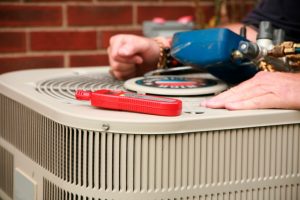 Refrigerant, a substance you may sometimes hear referred to by a name brand—Freon—is a necessary component of any conventional central AC system. There are a lot of misconceptions about refrigerant that cause some homeowners to assume problems exist where they don’t, or worse—that there is no problem when one does exist.
Refrigerant, a substance you may sometimes hear referred to by a name brand—Freon—is a necessary component of any conventional central AC system. There are a lot of misconceptions about refrigerant that cause some homeowners to assume problems exist where they don’t, or worse—that there is no problem when one does exist.
Your air conditioning system is charged with a set amount of refrigerant upon installation (which may not be “Freon” by name). We want to tell you more about the purpose of refrigerant and why low refrigerant may be more of a problem than you think.
The Purpose of Refrigerant
Refrigerant is able to transfer heat from one place to another under the right pressure and temperature conditions. It moves through an evaporator coil inside of your home and transfers from its liquid form to a gas. During this process, it is able to absorb heat in the air moving over the coil, so cool air returns to your home.
Refrigerant then moves outside to the compressor, which adds pressure, and to the condenser coil. As refrigerant condenses (turns back into a liquid), it can release heat into the air around the outdoor unit.
An air conditioner does not exactly create cooler air. Refrigerant actually transfers heat out of your home to cool down the air. Heat removal is the process that keeps you cool.
Why Refrigerant Should Not Run Low
Some people think of refrigerant in the same way they think of fuel. When a car runs out of fuel, you have to refill it. A car burns through fuel as a source of power. So when an air conditioner runs out of refrigerant, it may not surprise you.
As you can likely tell from your monthly energy bills, though, it’s not refrigerant that your air conditioner uses to run; it’s electricity. Electricity runs the motors that pump refrigerant from one part of your air conditioner to another in a cycle.
The air conditioner is designed to keep refrigerant in. If levels are low, you have a problem.
Sealing Refrigerant Leaks
Sometimes, it’s okay to add a bit of extra refrigerant when levels are low. However, a refrigerant drop usually indicates a major problem. Your technician may advise sealing refrigerant leaks before moving forward. While this AC repair will cost you, you’ll know that your air conditioner is using less energy and running more smoothly overall.
Types of Refrigerant
There are several types of refrigerant on the market today. (That’s why technicians don’t really use the term “Freon” to describe it.) However, some older refrigerants have been found to contribute to ozone depletion, and they are on the way to being phased out.
R-22 was the common refrigerant used in air conditioners decades ago. Today, no new air conditioners are manufactured to use this chemical blend, instead using a safer refrigerant like R-410A. If your system still uses R-22, it may still be available to technicians. However, it’s unsafe for the environment, and your system probably does not work as efficiently as you’d like anyway. It may be time for an AC upgrade, and our technicians are happy to help.
Contact Boehmer Heating & Cooling today for air conditioning services in Pittsburgh, PA.


